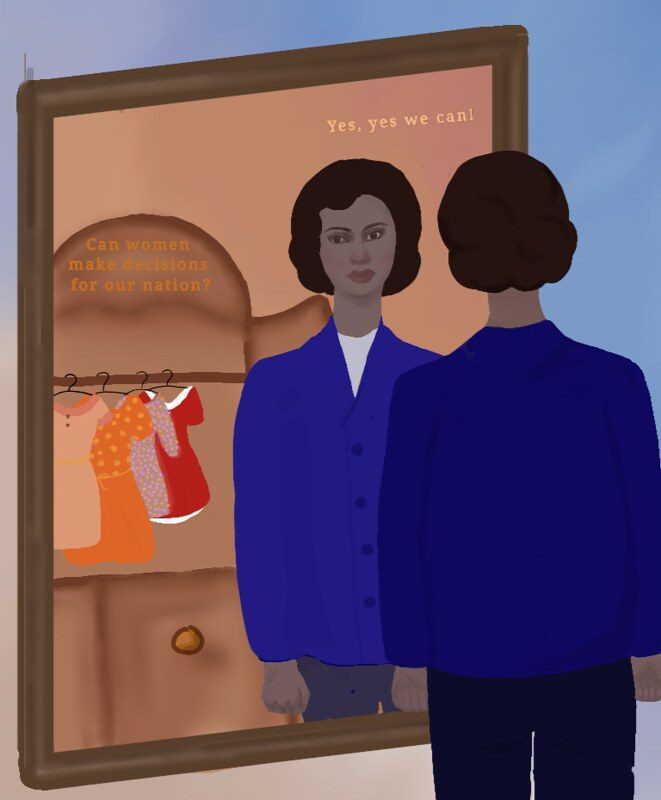The presence of women in politics will allow women to represent themselves
The presence of women in politics will yield improvements for not only women— but everyone.
October 10, 2020
On July 21, Rep. Ted Yoho verbally attacked Rep. Alexandria Ocasio-Cortez of New York’s 14th congressional district, in front of Capitol Hill by calling her a “disgusting.” When confronted, his hurtful words were masked by indirect apologies and outright denial, instead of attempts to understand the damage he had done.
While it may have just been a heat of the moment remark in the eyes of Yoho, for women all over the world, this behavior is something that occurs on a daily basis. Whether it is exhibited in front of a fast-food restaurant or even the steps in front of the White House, women periodically have to deal with degrading and unwarranted behavior in the form of sexist remarks and harassment.
Needless to say, the stigma of women has been ingrained throughout history. This stigma has appeared since the 18th century when all men could be “equal”; to the 20th century, where civil protest has brought a new era of representative civil rights movements; to now, the 21st century, where support for gender equality has reached an all-time high. However, as we take one step forward in representation, we take five steps back, with opposition continually increasing from the fear of breaking history.
“Starting in the 60s, that’s really when women started actually like speaking out […] and that’s when everyone realized, like, oh, you guys used to be silent. Now you’re using your voices. How do we deal with that?,” Rebecca Joseph, the Founder of Women in Politics, explained.. “So people were used to women just being pretty objects or something that took care of us as a motherly figure as a wife, daughter, grandmother, but not as an independent person with a view.”
This opposition highlights the pressing need for more female representation in politics.
Xiaoling Shu, a UC Davis professor of sociology, estimates that “women represent 23% of the House of Representatives, 25% in the Senate, and overall remains less than a third of all elected officials in the nation in 2019.”
These staggeringly low numbers mean that men dominate the current political atmosphere, and thus, make most of the decisions for how women live their lives.
“We need more women to be represented so that we can have that opinion and they can actually represent what we as a gender and society want, because right now we’re being dictated by men. Men obviously don’t understand what we need and what we want, so we need those women to be there to represent us,” Katherine Bronov, the Vice-Director of Women in Politics, explains.
In many cases, men and women in office can collaborate to create bills that will garner support but also protect women’s rights.
An example of this is the Women’s Health Protection Act, where both men and women discussed abortion. Congress representatives such as Judy Chu (D-CA), Lois Frankel (D-FL), and Marcia Fudge (D-OH), and Senators Richard Blumenthal (D-CT) and Tammy Baldwin (D-WI), all discoursed about a prominent female topic.
However, even with this beneficial collaboration, equal representation is something that will not come easily. The inevitable oppression women face from the sexist gender roles has been a part of our society for centuries.
“I don’t exactly think that we can change an old mindset because it’s already deeply rooted into everything that their lives were based upon, like our grandparents and ancestors and everything they were based on. They grew up on the fact that women stayed at home, “ Bronov said .
According to the same study, putting women in top positions of businesses and governments would improve the quality of life for 69% of Americans, with 77% of women’s lives improving and 57% of men’s lives improving.
But apart from this, we need to realize how the break off of these stereotypes actually will benefit society. A Pew Research Center poll found that women valued the qualities of compassion, empathy, cooperation, and civility more than men. They also stood up for their beliefs, resulting in additional political successes.
According to the same study, putting women in top positions of businesses and governments would improve the quality of life for 69% of Americans, with 77% of women’s lives improving and 57% of men’s lives improving.
People need to realize that women are making active solutions to combat our political climate’s current issues. Their policies and their presence will help thousands of Americans’ lives.
An example of this is of the bills passed by Judy Chu, the United States Representative for California’s 27th congressional district. For example, she is “an original cosponsor of the Protecting the Right to Organize (PRO) Act, a comprehensive bill to protect workers’ rights to join unions and collectively bargain.”
However, women also have to take reality into consideration. Although women’s voices have been much more recognized recently, they are still going to be deliberately misinterpreted by their peers.
“It’s as if when a man reacts, a woman equally overreacts,” Bronov states Bronov.
The overarching impacts that female politicians have made affect the everyday lives of regular women. Female politicians take into consideration the immediate actions, which results in fixing first-hand issues.
“First, women spend more time and effort communicating with their constituents than men,” , said Amy Steigerwalt and Jeffrey Lazarus, political science professors at Georgia State University. “Second, women deliver more government spending to their districts than male representatives do.”
This approach does not only benefit society in terms of politics, but it also gives a voice to women and inspires younger girls. It’s a matter of how and when we can achieve more women in politics. We will always seek progress towards more female leaders in politics, however, we won’t ever get to that point until opportunities are actually provided to women. Therefore, we need to start acknowledging and recognizing women’s accomplishments and giving the opportunities they deserve.
While society’s stigma of gender inequality will never fully disappear and equal representation will be hard to achieve, we must narrow the gap so the generations after us do not have to endure a system that does not represent them. Women’s presence in politics has already been proven to help Americans, especially those who are not currently represented in society and will continue to be a driving factor that will improve the country’s quality of life. What we need to do, to take the next steps in saying, is to start a revolution where women are equally represented in politics and society.


















